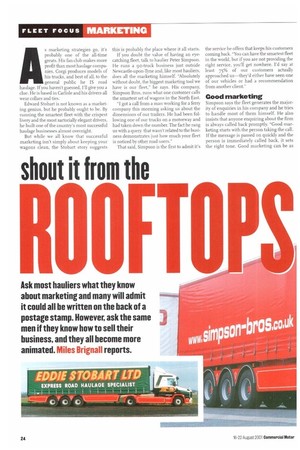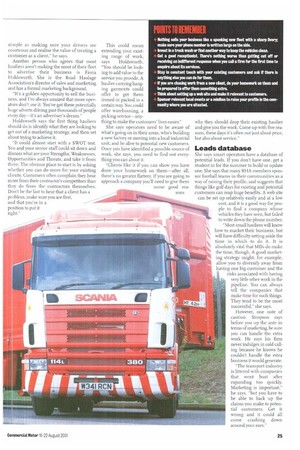shout it from the
Page 24

Page 25

If you've noticed an error in this article please click here to report it so we can fix it.
Ask most hauliers what they know about marketing and many will admit it could all be written on the back of a postage stamp. However, ask the same men if they know how to sell their business, and they all become more animated. Miles Brignall reports. As marketing strategies go, it's probably one of the all-time greats. His fan club makes more profit than most haulage companies, Corgi produces models of his trucks, and best of all, to the general public he IS road haulage. if you haven't guessed, I'll give you a clue. He is based in Carlisle and his drivers all wear collars and ties.
Edward Stobart is not known as a marketing genius, but he probably ought to be. By running the smartest fleet with the crispest livery and the most sartorially elegant drivers, he built one of the country's most successful haulage businesses almost overnight.
But while we all know that successful marketing isn't simply about keeping your wagons clean, the Stobart story suggests this is probably the place where it all starts.
If you doubt the value of having an eyecatching fleet, talk to haulier Peter Simpson. He runs a 90-truck business just outside Newcastle-upon-Tyne and, like most hauliers, does all the marketing himself. "Absolutely without doubt, the biggest marketing tool we have is our fleet," he says. His company, Simpson Bros, runs what one customer calls the smartest set of wagons in the North East.
"I got a call from a man working for a ferry company this morning asking us about the dimensions of our trailers. He had been following one of our trucks on a motorway and had taken down the number. The fact he rang us with a query that wasn't related to the business demonstrates just how much your fleet is noticed by other road users."
That said, Simpson is the first to admit it's the service he offers that keeps his customers coming back. "You can have the smartest fleet in the world, but if you are not providing the right service, you'll get nowhere. I'd say at least 75% of our customers actually approached us—they'd either have seen one of our vehicles or had a recommendation from another client."
Good marketing
Simpson says the fleet generates the majority of enquiries in his company and he tries to handle most of them himself. He also insists that anyone enquiring about the firm is always called back promptly. "Good marketing starts with the person taking the call. If the message is passed on quickly and the person is immediately called back, it sets the right tone. Good marketing can be as simple as making sure your drivers are courteous and realise the value of treating a customer as a client," he says.
Another person who agrees that most hauliers aren't making the most of their fleet to advertise their business is Fiona Holdsworth. She is the Road Haulage Association's director of sales and marketing and has a formal marketing background.
"It's a golden opportunity to sell the business, and I'm always amazed that more operators don't use it. You've got these potentially huge adverts driving past thousands of people every day—it's an advertiser's dream."
Holdsworth says the first thing hauliers should do is identify what they are looking to get out of a marketing strategy, and then set about trying to achieve it.
"It could almost start with a SWOT test. You and your senior staff could sit down and discuss what are your Strengths, Weaknesses, Opportunities and Threats, and take it from there. The obvious place to start is by asking whether you can do more for your existing clients. Customers often complain they hear more from their contractor's competitors than they do from the contractors themselves. Don't be the last to hear that a client has a problem, make sure you are first, and that you're in a position to put it right." This could mean extending your existing range of work, says Holdsworth. "You should be looking to add value to the service you provide. A haulier carrying hanging garments could offer to get them ironed or packed in a certain way. You could offer warehousing, a picking service—anything to make the customers' lives easier."
She says operators need to be aware of what's going on in their areas, who's building a new factory or moving into a local industrial unit, and be alive to potential new customers. Once you have identified a possible source of work, she says, you need to find out everything you can about it.
"Clients like it if you can show you have done your homework on them—after all, there's no greater flattery. If you are going to approach a company you'll need to give them sortie good reasons why they should drop their existing haulier and give you the work. Come up with five reasons, these days it's often not just about price, but also about service."
Leads database
She says smart operators have a database of potential leads. If you don't have one, get a student in for the summer to build or update one. She says that many RHA members sponsor football teams in their communities as a way of raising their profile, and suggests that things like golf days for existing and potential customers can reap huge benefits. A web site can be set up relatively easily and at a low cost, and it is a good way for peo ple to find a company whose vehicles they have seen, but failed to write down the phone number.
"Most small hauliers will know how to market their business, but will have difficulty setting aside the time in which to do it. It is absolutely vital that M Ds do make the time, though. A good marketing strategy might, for example, allow you to diversify away from having one big customer and the risks associated with having very little other work in the
Pipeline. You can always
tell the companies that make time for such things.
They tend to be the most successful," she says.
However, one note of caution. Simpson says before you up the ante in terms of marketing, be sure you can handle the extra work. He says his firm never indulges in cold calling because he knows he couldn't handle the extra business it would generate.
"'The transport industry is littered with companies that went bust after expanding too quickly. Marketing is important," he says, "but you have to be able to back up the claims you make to potential customers. Get it wrong and it could all come crashing down around your ears."
























































































































